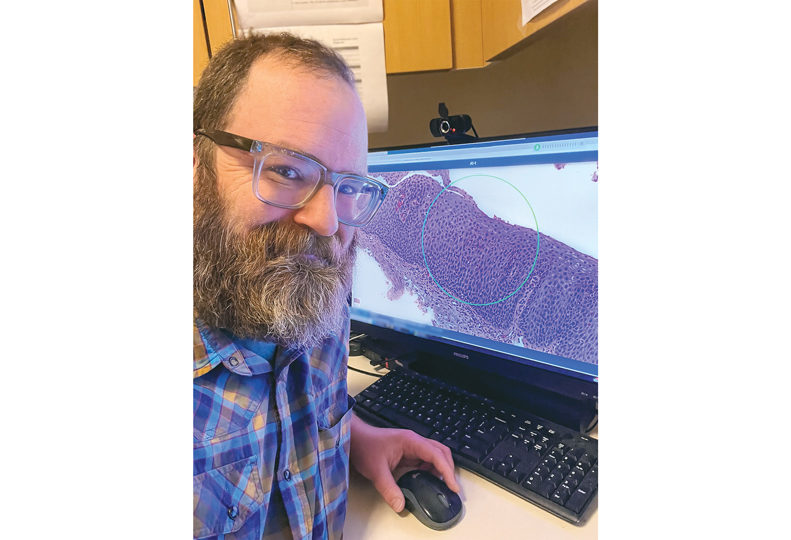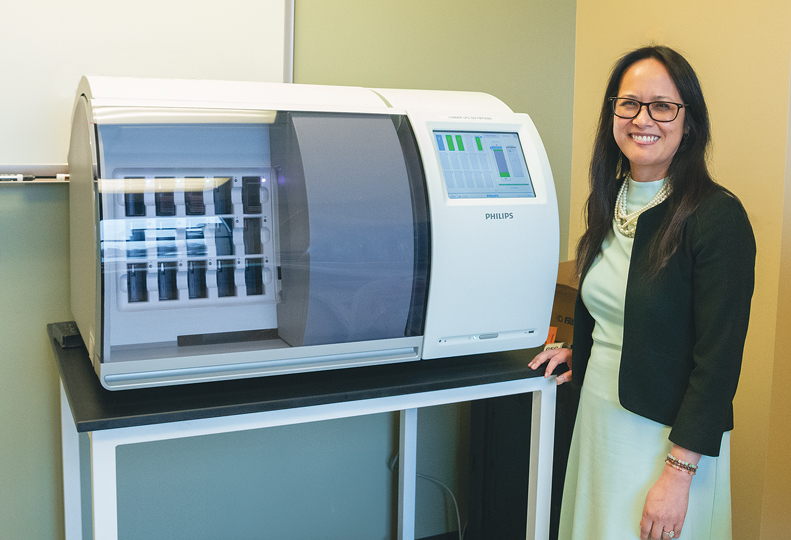Incyte Diagnostics goes digital

Scanning and digitizing pathological slides enables physicians to share and consult on cases instantaneously, says Dr. Isaac Grindeland, of Incyte Diagnostics.
| Incyte Diagnostics
Incyte: Pathology clinic installs ultra-fast slide scanners, prepares for AI future
Diagnostic pathology clinic Incyte Diagnostics has installed two digital pathology slide scanners at its Spokane Valley laboratory, marking a stride toward enhancing the clinic’s services, says Incyte pathologist Dr. Isaac Grindeland.
The two scanners are part of the Philips IntelliSite Pathology Solution, a clinical digital pathology system, and can scan up to 300 barcoded slides at a time, each slide taking about one minute to digitize. Each pathology slide is scanned at the equivalent magnification of 40 times actual size, resulting in high-resolution digital images.
“Digitally scanning slides so that you can view them on a computer opens up a lot of exciting ways for our company to be more efficient,” Grindeland says. “With digital, we can instantaneously get those slides to our pathologists to view from wherever they are sitting.”
Dr. Mari Patel, CEO of Incyte Diagnostics, echoes Grindeland’s assertion that the technology will accelerate the timeliness with which diagnosis can be rendered. Additionally, she emphasizes the importance of digital technology in communities without a comprehensive medical system. Outlying communities will at times have a generalized pathologist, but for complex cases that require the consultation of a subspecialty, such as pulmonary pathology, neuropathology, or pediatric pathology, those medical centers would require a longer time to render results to patients.
“Digital pathology helps the rural community tremendously … there are many subspecialties in the world of pathology,” says Patel. “A primary pathologist without specialty expertise can easily reach out for support. And that really helps provide equal access to our patients.”
Patel credits Grindeland for championing digital technology and researching the innovative products offered within the market. The IntelliSite Pathology Solution from the Dutch health technology company, Philips Multinational Conglomerate Corp., has been approved by the U.S. Food and Drug Administration, Patel says.
“Digital pathology has been around for quite some time, and the adoption of it is dependent on a lab’s resources and exposure to it,” she says.

Dr. Mari Patel, Incyte Diagnostics CEO, says the digital slide scanners will accelerate the time it takes to render diagnoses to patients. Isaiah Rinaldi
Incyte Diagnostics is a pathologist-owned, full-service clinical practice located in Spokane Valley at 13103 E. Mansfield and a clinical testing laboratory at 15912 E. Marietta, 2 1/2 miles east of the Mansfield headquarters. The company has about 50 pathologists and 350 employees spread throughout its Pacific Northwest enterprise, including two other physician’s clinics with laboratories in Tukwila and Richland, Washington. Incyte eventually will install the same digital slide scanners at its other hubs as well, says Patel. As reported earlier by the Journal, Incyte produced over 600,000 specimen slides in 2022. Patel declines to disclose figures for 2023.
Grindeland, a gastrointestinal pathologist, has been with Incyte Diagnostics for 10 years and is on the board of directors for the practice. When evaluating the scanners on the market, the reputation and quality of products offered by longtime manufacturer Philips stood out to Grindeland.
The Philips IntelliSite Pathology Solution is comprised of three components: the digital slide scanner, viewing software, and a server and storage application.
After Incyte’s technical staff has taken the necessary steps to procure histological specimens and transferred them onto the cassettes, they are loaded into the pathology scanners by lab technicians, and the machines will focus and scan each slide automatically without the need for adjusting or assistance. The scanners are run almost constantly, saving time, compared with viewing slides through a microscope, says Grindelan.
Historically, pathology has employed couriers to transport pathological slides to laboratories.
“But now with digital, we are not so much landlocked,” he says. “It’s just instantaneously moved into our computers for sharing.”
With the tools within the viewing software, pathologists can execute several tasks such as measuring tumors or cancers or measuring the distance of carcinomas from surgical margins, Grindeland says. The physicians also can circle areas of interest and conduct live consultations with multiple pathologists at the same time.
“That’s something we’ve never been able to do,” Grindeland says. “Unless we both have the same slide and look at it in our microscopes while talking on the phone, but that scenario doesn’t happen. It’s exciting to be able to communicate with each other about the same case.”
With the implementation of the two digital scanners and viewing software, Incyte has the capability to begin incorporating artificial technology into its workflow, but has yet to venture that way, he says. The company has invested in digital pathology first while it waits for the AI pathology market to settle.
“Right now, it’s almost like the wild, wild West when it comes to AI,” he says. “A lot of universities and large companies like Google are investing in it. It’s difficult to determine which product is the best and right one at the moment.”
Patel agrees that AI is in the future for pathology. “Step one is we ensure we have access to the digital scanners,” she says. “The adoption of AI is slow here in the U.S. in general, but it’s something we are definitely considering.”
































